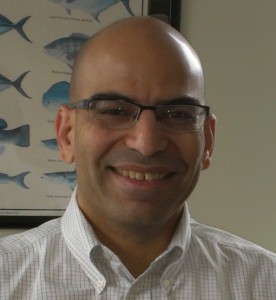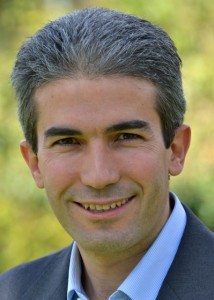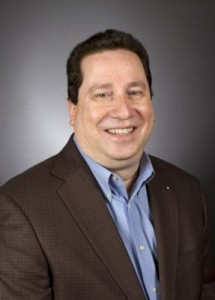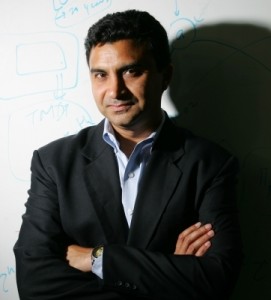Sara del Valle
Defense and Systems Analysis
Los Alamos NAtional Laboratory
sdelvall@lanl.gov
Sara del Valle’s research interests include developing mathematical and computational models for mitigating the spread of infectious diseases. She is interested in using systems of ordinary differential equations to study the spread of infectious diseases and the impact of mitigation strategies. She has developed simple and age-structured mathematical models for various diseases including HIV, smallpox, influenza, and malaria. Sara is also interested in understanding the impact that reactive community and individual behavior may have on the spread of diseases. Her research has shown that behavioral changes can significantly reduce the spread and shorten the epidemic.Sara attended the New Jersey Institute of Technology (NJIT), where she majored in applied mathematics. She joined the graduate program at the University of Iowa, with a fellowship from the Graduate Assistance in Areas of National Need program of the U.S. Department of Education and an Alfred P. Sloan Fellowship.
After completing het Ph.D. in 2005, Sara was offered a postdoctoral position at Los Alamos National Laboratory and soon after, she was converted into a permanent staff member. Currently, she works on mathematical and computational models for infectious diseases. She is also interested in understanding and modeling human behavior in response to epidemics and other disasters. Most recently, Sara has been using social media to study emergent human behavior during recent disasters, such as the 2009 H1N1 influenza pandemic. Her goal is to use social media to model and forecast human behavior to better predict the spread infectious diseases.
Francesco Bullo
Professor and Chair
Department of Mechanical Engineering
Center for Control, Dynamical Systems, and Computation
College of Engineering
University of California at Santa Barbara
bullo@engineering.ucsb.edu
Francesco Bullo is a Professor with the Mechanical Engineering Department at the University of California, Santa Barbara. He received the Laurea degree “summa cum laude” in Electrical Engineering from the University of Padova, Italy, in 1994, and the Ph.D. degree in Control and Dynamical Systems from the California Institute of Technology in 1999. From 1998 to 2004, he was an Assistant Professor with the Coordinated Science Laboratory at the University of Illinois at Urbana-Champaign.
His main research interest is multi-agent networks with application to robotic coordination, distributed computing and power networks. Other interests include vehicle routing, geometric control, and motion planning problems. He is the coauthor, with Andrew D. Lewis, of the book “Geometric Control of Mechanical Systems” (Springer, 2004, 0-387-22195-6) and, with Jorge Cortés and Sonia Martínez, of the book “Distributed Control of Robotic Networks” (Princeton, 2009, 978-0-691-14195-4). He is an IEEE Fellow. His students’ papers were finalists for the Best Student Paper Award at the IEEE Conference on Decision and Control (2002, 2005, 2007), and the American Control Conference (2005, 2006, 2010). He is a recipient of the 2003 ONR Young Investigator Award, the 2008 IEEE CSM Outstanding Paper Award and the 2010 Hugo Schuck Best Paper Award. He has published more than 200 papers in international journals, books, and refereed conferences. He has served or is serving on the Editorial Boards of “IEEE Transactions on Automatic Control,” “ESAIM: Control, Optimization, and the Calculus of Variations,” “SIAM Journal of Control and Optimization,” and “Mathematics of Control, Signals, and Systems”.
Daniel E. Rivera
Professor of Chemical Engineering and Program Director
Control Systems Engineering Laboratory
School for Engineering of Matter, Transport, and Energy
Arizona State University
daniel.rivera@asu.edu
Daniel E. Rivera became part of the faculty in the Department of Chemical Engineering at Arizona State University in the fall of 1990. Prior to joining ASU he was an Associate Research Engineer in the Control Systems Section of Shell Development Company. He received his Ph.D. in chemical engineering from the California Institute of Technology in 1987, and holds B.S. and M.S. degrees from the University of Rochester and the University of Wisconsin-Madison, respectively. He has been a visiting researcher with the Division of Automatic Control at Linköping University, Sweden, Honeywell Technology Center, the University “St. Cyril and Methodius” in Skopje, Macedonia, the National Distance Learning University (UNED) in Madrid, Spain, and the University of Almería in Andalucía, Spain.
His research interests include the topics of robust process control, system identification, and the application of control engineering principles to problems in process systems, supply chain management, and prevention and treatment interventions in behavioral health. Dr. Rivera was chosen as 1994-1995 Outstanding Undergraduate Educator by the ASU student chapter of AIChE, and was a recipient of 1997-1998 Teaching Excellence Award awarded by the College of Engineering and Applied Sciences at ASU. In 2007, Dr. Rivera was awarded a K25 Mentored Quantitative Research Career Development Award from the National Institutes of Health to study control systems approaches for fighting drug abuse.
Milind Tambe
Helen N. and Emmett H. Jones Professor in Engineering
Professor of Computer Science & Industrial and Systems Engineering Departments
Director of Teamcore Research Group on Agents and Multiagent Systems
University of Southern California
tambe@usc.edu
Milind Tambe is a fellow of AAAI (Association for Advancement of Artificial Intelligence), recipient of the ACM (Association for Computing Machinery) Autonomous Agents Research Award, Christopher Columbus Fellowship Foundation Homeland security award, “influential paper award” from the International Foundation for Agents and Multiagent Systems, the INFORMS Wagner prize for excellence in Operations Research practice, the Rist Prize of the Military Operations Research Society, best papers at a number of premier Artificial Intelligence Conferences and workshops (including multiple best paper awards at the International Conference on Autonomous Agents and Multiagent Systems and International Conference on Intelligent Virtual Agents), IBM Faculty Award, Okawa foundation faculty research award, RoboCup scientific challenge award and USC Viterbi School of Engineering use-inspired research award. Prof. Tambe pioneered the “security games” framework and with his Teamcore research group developed algorithms based on this framework that are now deployed for real-world use by several agencies including the US Coast Guard, the US Federal Air Marshals service, the Transportation Security Administration, LAX Police and the LA Sheriff’s Department for security scheduling at a variety of US ports, airports and transportation infrastructure. This research has led to him and his students receiving the US Coast Guard Meritorious Team Commendation from the Commandant, US Coast Guard First District’s Operational Excellence Award, Certificate of Appreciation from the US Federal Air Marshals Service and special commendation given by the Los Angeles World Airports police from the city of Los Angeles. In addition, for his teaching and service, Prof. Tambe has received the USC Steven B. Sample Teaching and Mentoring award and the ACM recognition of service award. Recently, he co-founded ARMORWAY, a company focused on risk mitigation and security resource optimization, where he serves on the board of directors. Prof. Tambe received his Ph.D. from the School of Computer Science at Carnegie Mellon University.
Current research interests include Artificial Intelligence, Intelligent agents and multi-agent systems, Computational and behavioral game theory, Multiagent and agent-human Teamwork, Team coordination and Planning under uncertainty (POMDPs and Dec-POMDPs), Distributed Constraint Optimization (DCOPs), Agent-based simulations, Crowd simulations, as well as Social network interactions and contagion. This research, driven by real-world practical challenges of security of our critical national infrastructure, sustainability of our natural resources and energy, and public safety, requires interdisciplinary partnerships, such as with the Game theory and human behavior group, which he founded at USC.

Jeff Shamma
Julian T. Hightower Chair in Systems & Control
Professor of Electrical and Computer Engineering
School of Electrical and Computer Engineering
Georgia Institute of Techonology
shamma@gatech.edu
Jeff Shamma’s general research interest is feedback control and systems theory. His most recent area of interest is game theory and decision making for multiagent models in engineered and societal networked systems.
Jeff received a BS in Mechanical Engineering from Georgia Tech in 1983 and a PhD in Systems Science and Engineering from the Massachusetts Institute of Technology in 1988. He has held faculty positions at the University of Minnesota, Minneapolis; University of Texas, Austin; and University of California, Los Angeles; and visiting positions at Caltech and MIT. In 2007, Jeff returned to Georgia Tech where he is a Professor of Electrical and Computer Engineering and Julian T. Hightower Chair in Systems & Control.
Jeff is a recipient of the NSF Young Investigator Award (1992) and the American Automatic Control Council Donald P. Eckman Award (1996), and a Fellow of the IEEE (2006). He previously served on the Air Force Scientific Advisory Board (2008–2011) and is currently an associate editor for the IEEE Transactions on Cybernetics (2009–present) and Games (2012–present) and a senior editor for the IEEE Transactions on Control of Networked Systems (2013-present).
Sharad Goel
Senior Researcher
Microsoft Research
sharad@microsoft.com
Sharad Goel works in the general area of computational social science, an emerging discipline at the intersection of computer science, statistics, and the social sciences. He is particularly interested in large-scale empirical analyzes that address questions motivated by sociology and economics. He blogs about these topics with Daniel Reeves at messymatters.com.
Sharad holds a PhD in Applied Mathematics and a Masters in Computer Science from Cornell, and a BS in Mathematics from the University of Chicago. Following postdoctoral positions in the math departments at Stanford and the University of Southern California, he joined the Microeconomics and Social Systems group at Yahoo! Research. He is currently a Senior Researcher at Microsoft Research at New York City.
Luca Benzoni
Senior Financial Economist
Federal Reserve Bank of Chicago
luca.benzoni@chi.frb.org
Luca Benzoni is a senior financial economist in the economic research department at the Federal Reserve Bank of Chicago. Benzoni’s research focuses on the modeling of volatility in equity and interest rate markets, derivatives pricing, asset allocation over the life cycle, and conflict of interest and certification in the U.S. IPO market.
Benzoni’s research has been published in the Journal of Finance, Journal of Financial Economics and Journal of Financial Intermediation. Before joining the Chicago Fed in September 2006, Benzoni was an assistant professor in finance at the University of Minnesota.
Benzoni received a B.A. from Bocconi University (Milan, Italy) and a Ph.D. in finance from the Kellogg School of Management, Northwestern University.





